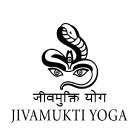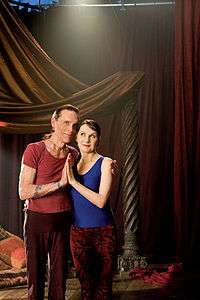Jivamukti Yoga
The Jivamukti Yoga method is a proprietary style of yoga created by David Life and Sharon Gannon in 1984.[1]
| Jivamukti Yoga | |
|---|---|
 140x Jivamukti Yoga logo | |
| Founder | David Life and Sharon Gannon, disciples of Sri Brahmananda Sarasvati, Swami Nirmalananda, and Sri K. Pattabhi Jois |
| Established | 1984 |
| Practice emphases | |
| scripture (shastra), devotion (bhakti), nonviolence (ahimsa), music (nada yoga), meditation (dhyana), hatha yoga. | |
| Related schools | |
| Ashtanga Vinyasa Yoga | |
Jivamukti is a physical, ethical, and spiritual practice, combining a vigorous yoga as exercise, vinyasa-based physical style with adherence to five central tenets: shastra (scripture), bhakti (devotion), ahimsā (nonviolence, non-harming), nāda (music), and dhyana (meditation). It also emphasizes animal rights, veganism, environmentalism,[2] and social activism.[3] Jivamukti Yoga has developed a reputation as the chosen yoga style of many celebrities.[4]
History

Jivamukti Yoga was co-founded in New York in 1984 by dancer and musician Sharon Gannon and her partner, artist and cafe owner David Life.[5] Gannon and Life met in 1982 in Manhattan. In 1986 they traveled together to India and took the Sivananda teacher training program and met Swami Nirmalananda. Upon their return, they opened the first Jivamukti Yoga Society in the East Village of New York City.[6] In 1990 they began to practice Ashtanga Yoga with Pattabhi Jois in Mysore, India. In 1993, in upstate New York, they met yoga scholar and ashram founder Shri Brahmananda Sarasvati (Yogi Mishra).
In 1998, having become "wildly successful", the yoga center moved to a 9,000 square feet (840 m2) studio on Lafayette Street; some 400 people subscribed, annual membership at that time costing $1200, rather more than a typical gym.[7] Stefanie Syman ascribes Jivamukti's "surprisingly profitabile" business with its merger of "overt spirituality, the chanting, the deities, and the sacred music and vigorous asana classes" to the culture at that moment in history, comparable to America of the late 1910s and early 1920s.[7] In 2000, Jivamukti opened a second center on the Upper East Side.[2][8] In 2003, senior Jivamukti students Patrick Broome and Gabriela Bozic opened Jivamukti Munich, the first Jivamukti Yoga Center outside of New York City. In 2006, the Jivamukti Yoga School NYC relocated their main headquarters to an environmentally constructed studio in Union Square.
The name Jivamukti is an adaptation of the Sanskrit जीवन्मुक्ति jivanmuktih, wherein jiva is the individual living soul, and mukti – like moksa – is liberation from the cycle of death and rebirth. Thus the Jivamukti method is "liberation while living".[9]
Main tenets
There are five main tenets of the Jivamukti method. These are:
Shastra
Shastra, or scripture, refers to the study and exploration of the four central texts of yoga as well as to the study of the Sanskrit language in which they were first written. The four texts are the Yoga Sutras of Patanjali, the Hatha Yoga Pradipika, the Bhagavad Gita, and the Upanishads.
Bhakti
Bhakti, literally "devotion to God", is the practice of devotion and humility. Jivamukti Yoga holds that "God-realization" is the goal of yoga practice, and that it does not matter to what form of God one's love and devotion is directed; what matters is that the devotion should be directed to something higher than one's own self or ego. Inter-religious understanding and tolerance are significant corollaries to this practice, and altars in Jivamukti centers are typically adorned with images of multiple religious and moral authorities: Gandhi, Martin Luther King and Ingrid Newkirk intermingle with Jesus, Buddha, and Krishna.
Ahimsa
Ahimsa is the practice of nonviolence, or non-harming. Ahimsa is informed by compassion, and is defined in Patanjali's Yoga Sutra as the first of five yamas. Yamas define the measure of how the yogi relates to other people and to the external world. The Jivamukti method teaches that the practice of ahimsa extends not only to other humans but to all animal life and advocates ethical vegetarianism both as a means of resolving human karma and as an environmental imperative for the future health of the planet.[10] The Jivamukti method further teaches that the practice of ahimsa includes promoting and providing educational information about animal rights, environmental concerns, and the need to take social/political action.[11]
Nāda
Nāda yoga centers on deep inner listening, chanting, and elevated music. Its theoretical and practical aspects are based on the premise that everything that exists, including human beings, consists of sound vibrations, called nāda. The aim of hatha yoga is to hear the nadam – the soundless sound, which is Om – by first perfecting the ability to listen. Jivamukti Yoga practices this through chanting and inspirational music.[10]
Jivamukti classes typically include Sanskrit chanting which integrates scriptural study and bhakti practice with nāda yoga.
Contrary to many other schools of yoga, Jivamukti teachers generally do not do the postures while they teach a class. This encourages students to learn by listening, rather than by watching, and in this way develop their ability to listen effectively. Sharon Gannon summarizes the intention of this approach as follows: “Through listening, hearing arises, through hearing knowing, through knowing becoming, by becoming being is possible.”[12]
Dhyana
Dhyana, or meditation, as taught in the Jivamukti method is the practice of being still and watching one's own mind think. This practice is intended to enable a person to cease to identify with their thoughts and realize that they are more than their thoughts. All Jivamukti Yoga classes include a meditation practice.[10]
Branding and ownership
Jivamukti Yoga is a branded, proprietary yoga method. The trade name and trademark Jivamukti is owned by Jivamukti Global., a for-profit corporation based in Shady, New York, U.S., and has been continuously used in connection with the corporation's business since 1984.[13] All Jivamukti-branded yoga centers are independently owned and operated through specific license agreements with senior teachers of the Jivamukti method. There are Jivamukti Yoga centers in New York City, Los Angeles, Jersey City, Barcelona,,Norway, Sydney, Berlin, Munich, London and Schloss Elmau in Bavaria, Germany and provides Jivamukti-branded yoga instruction (yoga classes, workshops, retreats, teacher training and certification classes), clothing, body-care products, and instructional materials (books, audio, and video recordings).[13] Jivamukti, Inc. also holds trademarks on Jivamukti Yoga, Jivamuktea, Jivamuktea Cafe, and In-Class Private.[14] Jivamukti, Inc.'s Chief Operating Officer is David Life's nephew, Jules Febre.[15]
Prior to this, the Jivamukti Yoga trade name and trademark was registered by the corporation, Jivamukti Yoga Center, Inc., which lists Sharon Gannon as its Chief Executive Officer and President, and David Kirkpatrick (the legal name of David Life) and Ana Maria Velasco as corporate officers (both now inactive).[16]
Books
- Jivamukti Yoga: Practices for Liberating Body and Soul (Sharon Gannon, David Life; 2002; ISBN 0-345-44208-3)
- The Art of Yoga (Sharon Gannon, David Life, Martin Brading; 2002; ISBN 1-58479-207-8)
- Yoga and Vegetarianism: The Diet of Enlightenment (Sharon Gannon; 2008; ISBN 1-60109-021-8)
- "Yoga Assists: A Complete Visual & Inspirational Guide To Yoga Asana Assists" (Sharon Gannon, David Life; 2012; ISBN 1-624-67054-7)
- Simple Recipes for Joy (Sharon Gannon)
- The Magic 10 and Beyond (Sharon Gannon)
Centers
Jivamukti Yoga is the primary method taught at eleven yoga centers ("full program centers") and is also formally recognized as being taught at more than thirty others ("affiliate centers"). Instruction in these centers is based on the philosophy developed by Gannon and Life, which is in turn based on the guidance of their gurus and on classical yoga as described in the Yoga Sūtras of Patañjali, the Bhagavad Gita, and Hatha Yoga Pradipika. To teach the Jivamukti Yoga method in one of its centers, an instructor is first required to go through rigorous training and to pass a series of examinations.
Jivamukti Yoga's full program centers are located in the United States (New York City, Jersey City, and Los Angeles.), Germany (Munich, Berlin, and Schloss Elmau), Spain (Barcelona), Norway (Stavanger), Australia (Sydney), Russia (Moscow) and Mexico (Puebla). Its affiliate centers are located throughout the United States and in Australia, Germany, Greece, Japan, Luxembourg, the Netherlands, Norway, Russia, South Africa, Spain, Switzerland, and the United Kingdom.[11]
Jivamukti Yoga School NYC, the Jivamukti Yoga school located at Union Square in Manhattan, has been featured on the BBC, ABC, PBS, and in the New York Times and New York Magazine.[8]
In 2003, the Jivamukti Yoga School NYC established a 125-acre nature preserve in the Catskill Mountains, near Woodstock, New York. Known as the Wild Woodstock Jivamukti Forest Sanctuary, it serves as the country ashram for the Jivamukti Yoga School and a safe haven and unpolluted habitat for diverse plant and animal species.[17]
Controversies
In 2016, accusations of sexual harassment were made public against one of Jivamukti Yoga School's most senior teachers, Ruth Lauer-Manenti, by one of her female students. The student filed a lawsuit, which has since been settled for an undisclosed amount. Author and blogger Michelle Goldberg questioned in Slate magazine whether Jivamukti is a workplace, an ashram, or a cult, with a culture of spiritual abuse and secrecy.[18][19]
Author and yoga teacher Matthew Remski reported, based on interviews with former employees of Jivamukti, that Jivamukti Yoga School NYC used non-disclosure agreements to "smooth over student grievances against teachers, or teacher’s [sic] grievances against management", and to prevent former students and employees from discussing the school’s culture. In exchange, Remski writes, departing personnel and students received cash payments or tuition refunds.[20]
Celebrity practitioners
Some celebrities who practice or have practiced Jivamukti Yoga are:
- Elizabeth Berkley[21]
- Willem Dafoe[22][7]
- Michael Franti[2]
- Maggie Gyllenhaal[23]
- Donna Karan[22]
- Diane Keaton[24]
- Heidi Klum[25]
- Madonna[26][23]
- Steve Martin[27]
- Mike D[2][21]
- Gwyneth Paltrow[24]
- Sarah Jessica Parker[7]
- Travis Rice[28]
- Russell Simmons[2][21]
- Sting[2][7][22][21][23]
- Trudie Styler[2][22]
- Uma Thurman[2][21]
- Christy Turlington[22][21][7]
References
- "What is Jivamukti Yoga?". Yoga Dojo. Retrieved 28 February 2019.
- Rollefson, Andrea. "Getting Green in the Big Apple". ascent. Archived from the original on 30 September 2011. Retrieved 24 September 2011.
- Clyne, Catherine. "kti: Teaching Peace". SATYA. Archived from the original on 13 July 2011. Retrieved 28 September 2011.
- Funderburg, Lise (15 April 2001). "I Don't Have a Problem Representing Yoga". Time Magazine. Retrieved 28 September 2011.
- "Jivamukti Yoga". Yoga Haven.
- "Meet the Innovators: Sharon Gannon & David Life". Yoga Journal. 28 August 2008.
- Syman 2010, pp. 281–283.
- Hammond, Holly (October 2000). "Meet the Innovators! 25 American Originals Who Are Shaping Yoga Today". Yoga Journal.
- Sharon Gannon and David Life, Jivamukti Yoga: Practices for Liberating Body and Soul, New York: Ballantine Books, 2002, p. xvii.
- "The Five Pillars of Jivamukti Yoga". Jivamukti Yoga Sweden. Archived from the original on 2 May 2011. Retrieved 24 September 2011.
- "What is Jivamukti Yoga". Jivamukti Yoga School. Archived from the original on 1 October 2011. Retrieved 9 October 2011.
- Marguin, Vita. "I am yoga - I am activism - I am Jivamukti". Archived from the original on 1 August 2013. Retrieved 23 February 2013.
- "Administrative Panel Decision Jivamukti, Inc. v. Private Registration (B3) Case No. D2010-1738". World Intellectual Property Organization Arbitration and Mediation Center. Retrieved 28 December 2011.
- "Trademarkia". Trademarkia. Retrieved 28 December 2011.
- "Jules Febre". Jivamukti Yoga. Archived from the original on 22 January 2012. Retrieved 28 December 2011.
- "USPTO-TARP record". United States Patent and Trademark Office Trademark Application and Registration Retrieval. Retrieved 28 December 2011.
- "Wild Woodstock Jivamukti Forest Sanctuary". Jivamukti Yoga. Retrieved 18 July 2013.
- Goldberg, Michelle. "A Workplace, an Ashram, or a Cult? Inside the sexual harassment lawsuit against Jivamukti Yoga". The Slate Group. Retrieved 5 Feb 2018.
- Herrington, Sarah (7 June 2017). "Yoga Teachers Need a Code of Ethics". The New York Times.
- Remski, Matthew. "Silence and Silencing at Jivamukti Yoga and Beyond". Decolonizing Yoga. Retrieved 5 Feb 2018.
- Brydson, Nicole. "Manhattan Yoga Mania: Celebrity Mat Spreads As Jivamukti Opens". New York Observer. Retrieved 27 November 2013.
- Jolly, Mark. "Yoga's Big Stretch". New York Magazine. Retrieved 24 September 2011.
- McKillop, Jamie. "Jivamukti's Sharon Gannon explains how veganism leads to joy". Well+Good. Well+Good LLC. Retrieved 1 August 2015.
- "Jivamukti Yoga". Zeel. Retrieved 27 November 2013.
- YogaDork. "Heidi Klum Tries Yoga, We Dig! (photos)". YogaDork. Retrieved 7 April 2012.
- "Tough stance" (PDF). Harpers. Retrieved 21 November 2014.
- "The (Jivamukti) Yoga Scene in New York City". Virtual Satsang. Retrieved 27 November 2013.
- "Snowboarder Travis Rice on sustaining his body through diet, hydration and yoga".
Sources
- Syman, Stefanie (2010). The Subtle Body : the Story of Yoga in America. Farrar, Straus and Giroux. ISBN 978-0-374-53284-0. OCLC 456171421.CS1 maint: ref=harv (link)

_from_Jogapradipika_1830_(detail).jpg)